| | | | | | | Presented By Raytheon Technologies | | | | Axios World | | By Dave Lawler ·Dec 10, 2020 | | Welcome back to Axios World. - We're focusing tonight on Trump's big announcement on Morocco and the future of the Abraham Accords under Biden (1,704 words, 6 minutes).
New arrival? Sign up. | | | | | | 1 big thing: Trump's deal with Morocco |  | | | Trump with Netanyahu before signing the Abraham Accords. Photo: Saul Loeb/AFP via Getty Images | | | | President Trump announced a deal with Morocco today that included two major provisions: Morocco will establish diplomatic relations with Israel, and the U.S. will recognize Morocco's sovereignty over the disputed territory of Western Sahara. Why it matters: Morocco is the fourth Arab country to move toward normalization with Israel in the last four months. To make the deal, Trump reversed decades of U.S. policy on Western Sahara — with just six weeks left in his term. Behind the scenes: The deal was reached through bilateral U.S.-Morocco negotiations, with Israel in the loop but not involved in the talks, Axios' Barak Ravid reports. - Jared Kushner, who led the talks from the U.S. side, said in a briefing with reporters that Morocco had agreed to resume official contacts with Israel, allow Israeli airlines to use Moroccan airspace, and begin direct flights between the countries.
- Kushner said Morocco and Israel would open diplomatic liaison offices in Rabat and Tel Aviv, and later embassies. The U.S. will also open a consulate in the city of Dakhla in Western Sahara.
- Worth noting: Reuters reported today that the U.S. is negotiating a drones sale to Morocco, though it's unclear whether it's linked to the diplomatic deal.
Flashback: Morocco previously opened diplomatic relations with Israel in the 1990s, but severed them in 2000. - In the 20 years since, there have been several secret meetings between senior Israeli and Moroccan officials, Barak reports. The countries' intelligence agencies have also maintained covert relations.
The big picture: The U.S. is now the only Western country to recognize Moroccan sovereignty over Western Sahara, providing a diplomatic breakthrough for which the kingdom has lobbied for decades. - The sparsely populated territory on the northwest corner of Africa is sometimes referred to as "Africa's last colony." It was annexed by Morocco in 1975, after former colonial power Spain surrendered control.
- The local Sahrawi population, represented by the Polisario Front, fought Morocco for independence until the UN brokered a peace agreement in 1991. That agreement called for an independence referendum, which has never been held.
- Morocco, which administers two-thirds of the territory, has continued to strengthen its position in Western Sahara, but without recognition from the international community — until today.
- "In the small world of diplomacy, it's a bomb. Forty years of debate erased in one tweet," tweeted Gérard Araud, the former French ambassador to the UN and U.S. "What will the Biden administration do?"
What to watch: Biden may do nothing, recognizing that reversing Trump's decision would damage America's relationship with Morocco and likely derail the kingdom's normalization process with Israel. - "I would be surprised if they undo it," says Intissar Fakir, a North Africa expert at the Carnegie Endowment. "Trying to turn back the clock on this could cause more of a headache than just going with it and being as ambiguous about it as they can be."
|     | | | | | | 2. Why the Western Sahara move matters | 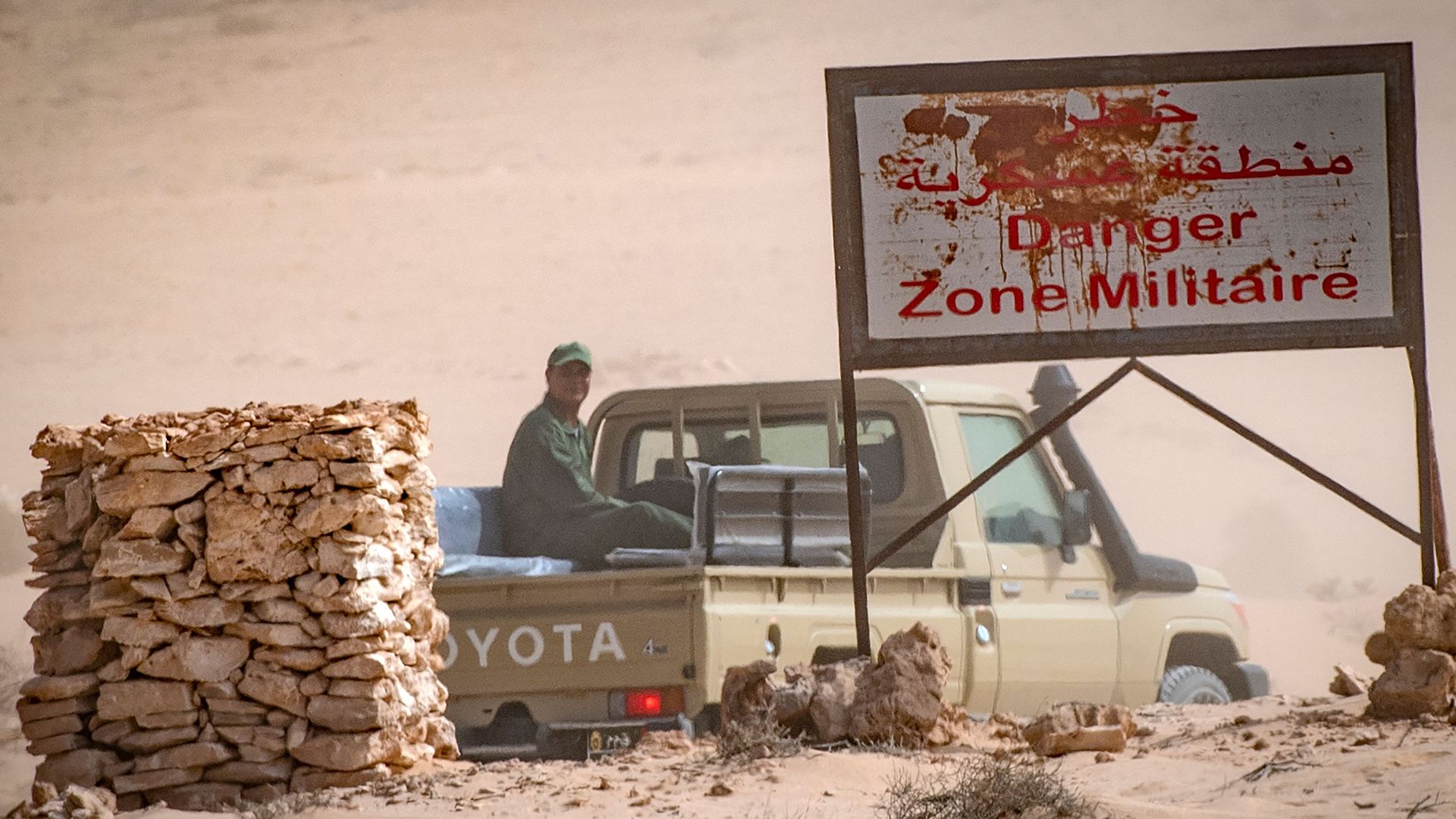 | | | A Moroccan soldier at a checkpoint in Western Sahara. Photo: Fadel Senna/AFP via Getty Images | | | | Normalization with Israel would, on its own, be "a very risky move for Morocco," Fakir says. Breaking it down: Just 4% of Moroccans polled in the 2019–2020 Arab Opinion Index supported diplomatic recognition for Israel, with 88% opposed. - The kingdom has taken a cautious approach to today's announcement, at least for domestic audiences, but is unlikely to see the sort of public anger that normalization with Israel would otherwise generate.
"The Western Sahara cause is a very unifying cause in Morocco. The vast majority of Moroccans really do stand behind the monarchy in that regard," Fakir says. - The monarchy's top foreign policy objective has for years been to secure as much recognition as possible for its control of the territory, she says.
- "Having such an important win really bolsters their legitimacy, particularly at a time when the country is going through a lot of challenges."
In Algeria — where the Polisario is based and where some 200,000 Sahrawis live, many of them in refugee camps — the reception will be far less positive. Driving the news: The announcement also comes just a month after the long-standing ceasefire between Morocco and the Polisario Front collapsed after nearly three decades. - The skirmishes began after Morocco violently cleared a highway that had been blockaded by Sahrawi protesters.
- The Polisario Front then announced a return to armed resistance, though there have been no reports of significant victories or casualties to date.
Where things stand: "There's an entire generation of Sahrawi's who have been essentially waiting on some kind of movement on this issue," Fakir says. - With the diplomatic momentum heading in the wrong direction, "there's not a whole lot the Polisario can do other than to go back to conflict to try to bring some sort of attention to this issue," Fakir says.
- The other side: Morocco has never been in a stronger position in the conflict, particularly after Trump's announcement, she adds.
Worth noting: Morocco's move is als0 yet another diplomatic defeat for the Palestinian Authority. - Morocco's King Mohammed VI spoke with Palestinian President Mahmoud Abbas today and stressed that his country "stands by a two-state solution to the Israeli-Palestinian conflict," according to a statement from the royal court.
|     | | | | | | 3. Biden to stick with Abraham Accords process |  | | | Illustration: Aïda Amer/Axios | | | | Biden's foreign policy team disagrees with nearly every major decision Trump has made, but the Abraham Accords are an exception. What they're saying: "Our hope is to strengthen and deepen and expand the normalization of relations between Israel and the Arab states," Jake Sullivan, Biden's incoming national security adviser, said this week, prior to the Morocco announcement. - Dan Shapiro, former U.S. ambassador to Israel under Barack Obama, told Axios that normalizing ties "is something Biden made clear during the campaign that he embraces. He said he'll push it forward, and they'll try to get other Arab states to do the same thing."
- Secretary of State-nominee Tony Blinken made similar comments to Jewish Insider, though he said some were "overstating" the significance of the deals Trump had struck.
- "It might be the only Trump foreign policy initiative that Biden has had something positive to say about," one Biden adviser told Barak and Axios' Alayna Treene.
The endgame: Biden would leverage the accords differently than Trump, Shapiro said. - He could use additional deals to induce Israeli Prime Minister Benjamin Netanyahu to make concessions that keep open the possibility of a Palestinian state — as when Netanyahu dropped his annexation plans to reach a deal with the UAE.
What to watch: Saudi Arabia is one Arab nation that has not normalized relations with Israel, despite Kushner's last-ditch effort to broker a deal when he visited the region last week. - The Saudis are waiting for Biden to assume office before making such a decision.
|     | | | | | | A message from Raytheon Technologies | | The future of aerospace and defense is here | | | 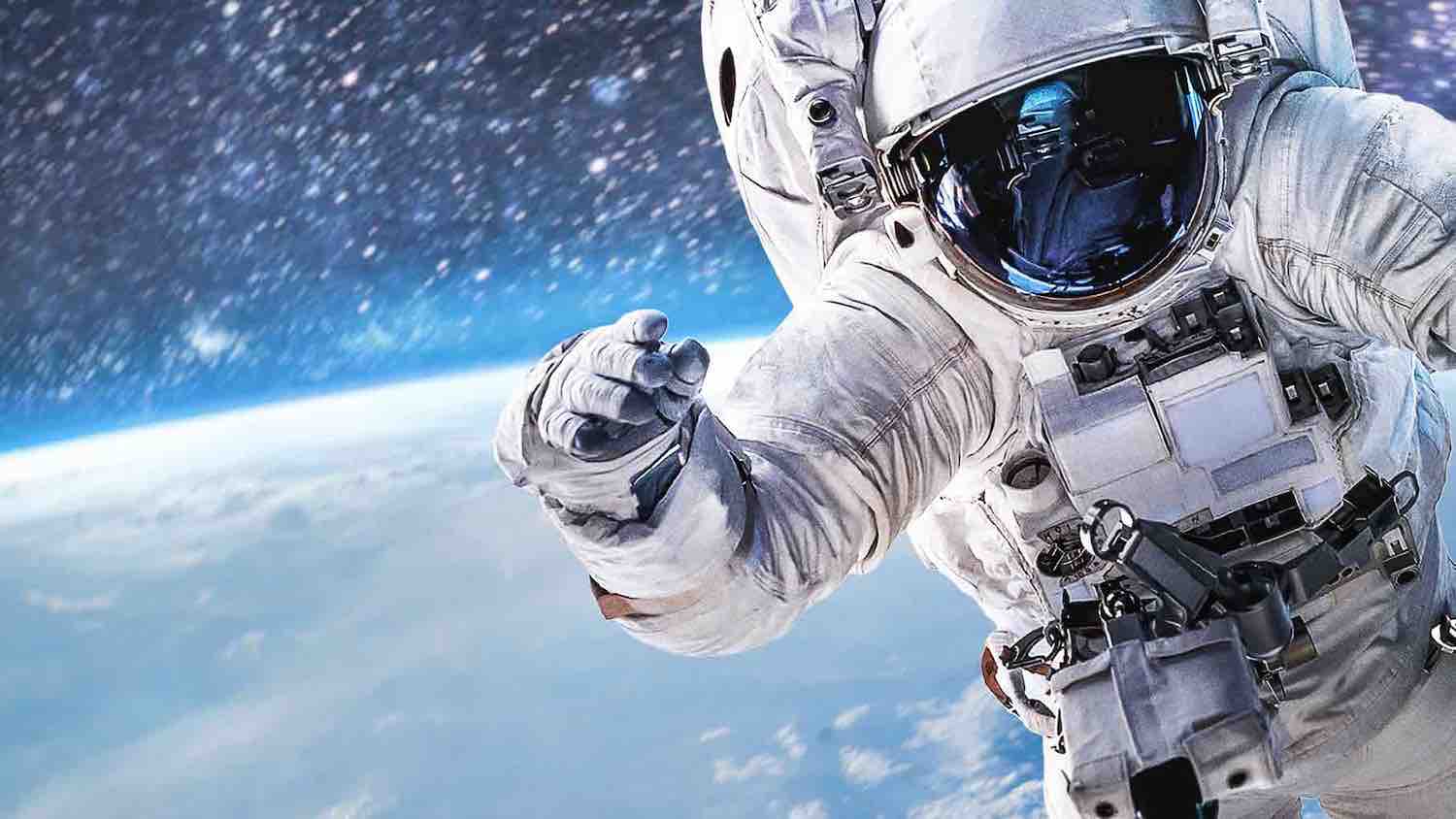 | | | | At Raytheon Technologies, nearly 200,000 engineers, scientists and researchers are pushing the limits of known science to explore deep space, advance aviation and build smarter defense systems that protect all of us here at home. That's the future of aerospace and defense. Learn more at RTX.com | | | | | | 4. The view from Khartoum: Not a done deal | 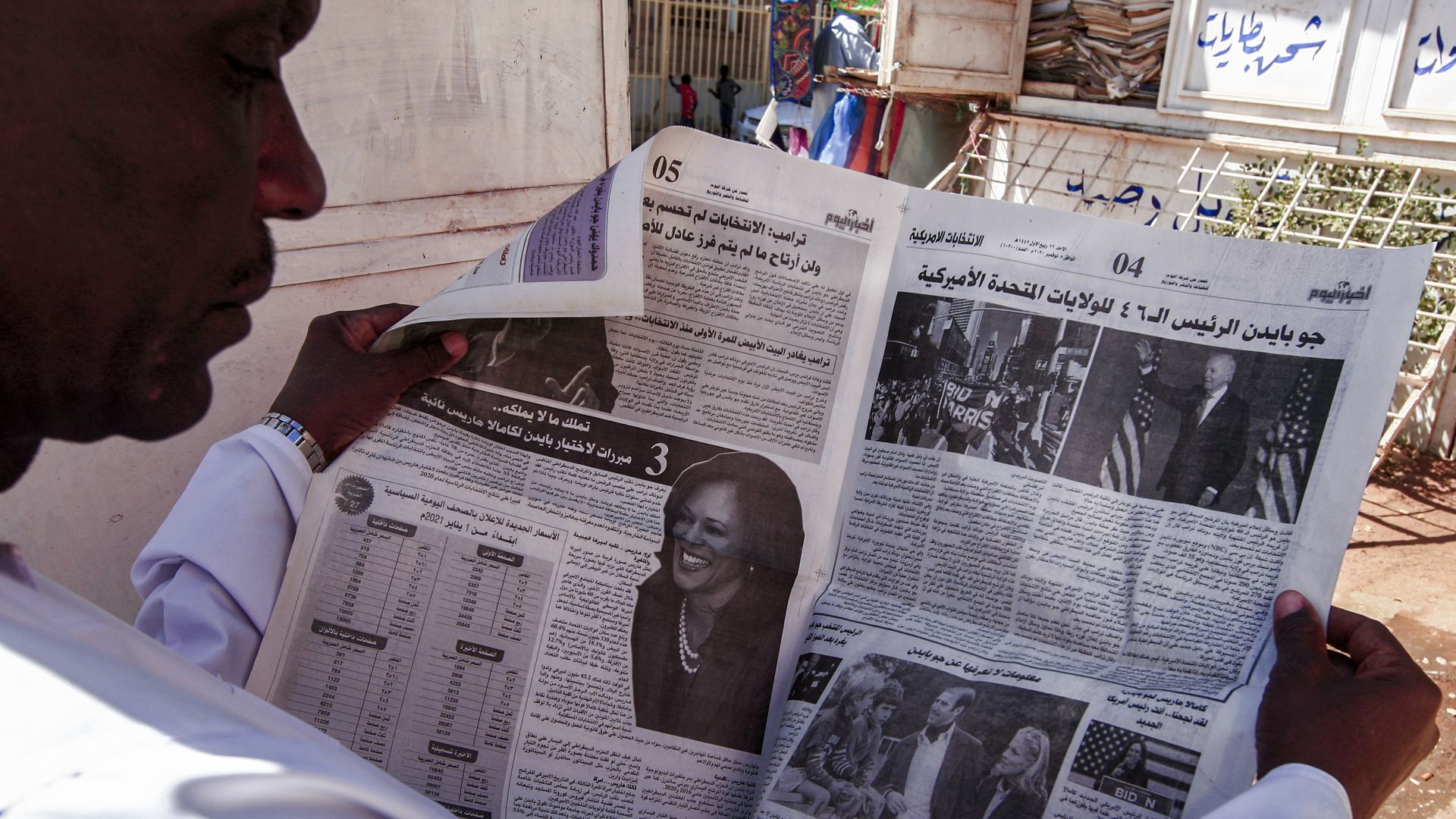 | | | Reading about the U.S. election results, in Khartoum, Sudan. Photo: Ebrahim Hamid/AFP via Getty | | | | Most Sudanese thought until recently that getting off the U.S. state sponsors of terrorism list was a done deal after their normalization pact with Israel. Now they realize it's more complicated, Sudanese journalist Wasil Ali writes from Khartoum. Why it matters: One crucial element of the trilateral deal between the U.S., Israel and Sudan was the restoration of Sudan's sovereign immunity, which would protect the country from future terror-related lawsuits. - While Sudan will soon be officially removed from the terror list, it still needs the U.S. Congress to pass the immunity legislation in the coming days, or else foreign investors may steer clear of Sudan for fear of entanglement in multibillion-dollar terror claims.
Background: Prime Minister Abdalla Hamdok's government agreed to pay compensation to resolve the existing lawsuits, which were tied to the harboring of al-Qaeda by former dictator Omar al-Bashir. - That decision angered many Sudanese, who felt they should not pay for the deeds of the previous regime, particularly at a time of economic distress. Quite to the contrary, some argued they should be rewarded for toppling Bashir.
- All of the critics had something in common: a lack of trust in the U.S. to follow through on its delisting promises and a suspicion that Washington would keep moving the goalposts.
What's next: Negotiations between the Trump administration and Democratic senators over the immunity bill are still ongoing with time running out. - The main stumbling block is the demand by families of 9/11 victims to be able to file lawsuits against Sudan, even though there is no evidence Sudan was involved in the attacks.
- A sense of concern and even despair can be felt among the public and in government circles in Khartoum, particularly as the economic situation becomes more dire.
|     | | | | | | 5. Global news roundup | 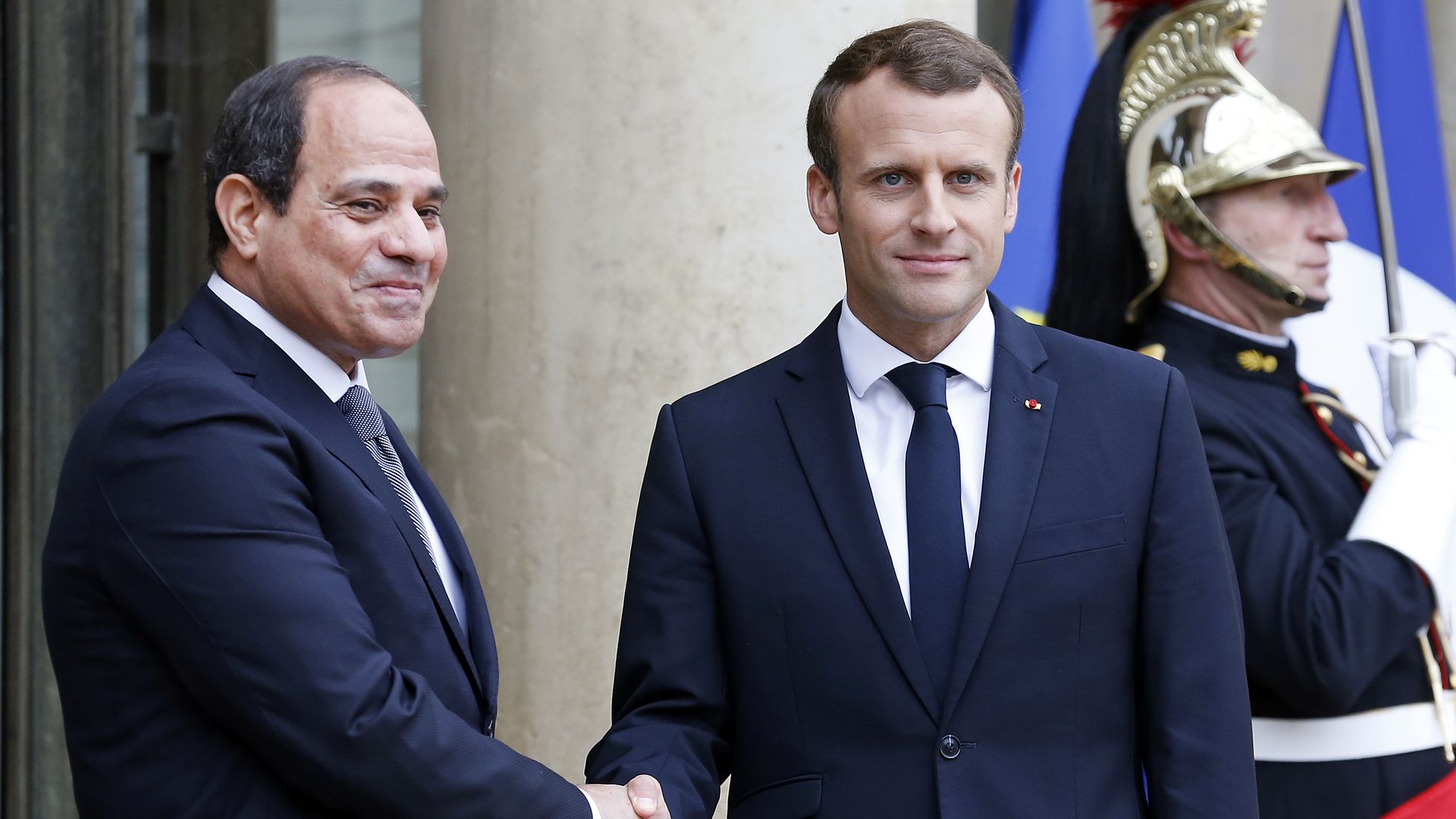 | | | It's an Honneur. Photo: Chesnot/Getty Images | | | | 1. Canada joined the U.K. and Bahrain in approving the Pfizer/BioNTech vaccine on Wednesday, with vaccinations expected to start next week. The U.S. appears close behind. 2. Brexit talks are going badly. - The U.K. and EU set a Sunday deadline for a trade deal, and both sides called for preparations to ramp up for the increasingly likely scenario that the U.K. crashes out without one on Dec. 31. Go deeper.
- Worth noting: You might hear U.K. Prime Minister Boris Johnson talk up the "Australia option." That's the same thing as "no deal."
3. The Japanese town of Kusatsu overwhelmingly voted to expel its only female assembly member after she accused the mayor of sexual assault. - The referendum was called after the mayor and other assembly members accused her of damaging the town's reputation.
- "This is a very, very typical Japanese reaction against female victim-survivors," Hiroko Goto of Chiba University told the NYT.
4. Lawmakers in Argentina debated a bill today to legalize abortion in most cases. It is expected to pass narrowly. 5. French President Emmanuel Macron reportedly gave Egyptian dictator Abdel Fattah el-Sisi France's highest honor, the Legion d'Honneur, during a visit to Paris this week. - The move is typical during a state visit, but controversial given Sisi's record on human rights.
- The news emerged via an official Egyptian government website as French media outlets weren't invited to the ceremony.
|     | | | | | | Bonus: Spies, sex and politics | 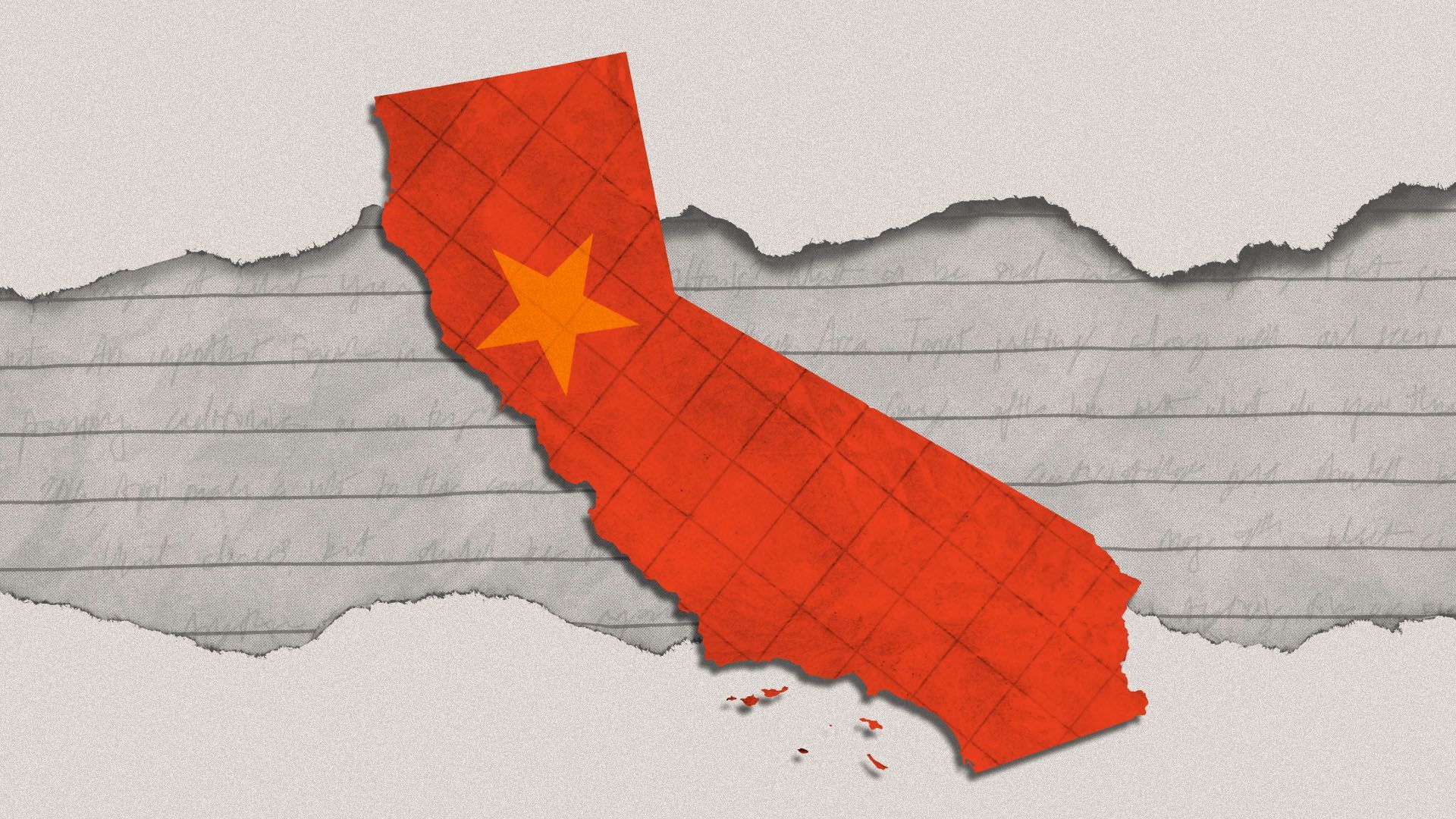 | | | Illustration: Sarah Grillo/Axios | | | | If you haven't read my colleagues' deeply reported investigation into Chinese espionage in Bay Area politics (or even if you have), I'd highly recommend the podcast version. It's excellent, and just 20 minutes. Dive in. |     | | | | | | 6. What's killing the world |  Adapted from World Health Organization; Chart: Andrew Witherspoon/Axios Almost 75% of the world's deaths last year were from non-communicable diseases like heart disease, diabetes and cancer, according to the World Health Organization. - Worldwide life expectancy is now up to an average of 73 years — six years longer than it was in 2000, Axios' Marisa Fernandez writes.
- But chronic, and in some cases preventable, disease is also taking a bigger toll.
Go deeper |     | | | | | | 7. Stories we're watching |  | | | A morning's catch, in Mozambique. Photo: Alfredo Zuniga/AFP via Getty | | | - Biden's Pentagon pick faces uphill confirmation fight
- Lebanon PM charged over Beirut explosion
- UN sizes up massive "emissions gap"
- Biden and Netanyahu on collision course over Iran
- How Kerry's role will work
- Buttigieg may get China post
- Soccer star Griezmann ends partnership with Huawei
Quoted: "They still say they do not have any cases, which is hard to believe. So, all signs are the regime is very intensely focused on controlling the disease that they say they do not have." — South Korean Foreign Minister Kang Kyung-wha, on North Korea "We will never forget her words and she might have to pay dearly for it." — Kim Yo-jong, the sister and top adviser to Kim Jong-un |     | | | | | | A message from Raytheon Technologies | | The future of aerospace and defense is here | | |  | | | | At Raytheon Technologies, nearly 200,000 engineers, scientists and researchers are pushing the limits of known science to explore deep space, advance aviation and build smarter defense systems that protect all of us here at home. That's the future of aerospace and defense. Learn more at RTX.com | | | | | | Axios thanks our partners for supporting our newsletters.
Sponsorship has no influence on editorial content. Axios, 3100 Clarendon Blvd, Suite 1300, Arlington VA 22201 | | | You received this email because you signed up for newsletters from Axios.
Change your preferences or unsubscribe here. | | | Was this email forwarded to you?
Sign up now to get Axios in your inbox. | | | | Follow Axios on social media:    | | | | | |
Post a Comment
0Comments